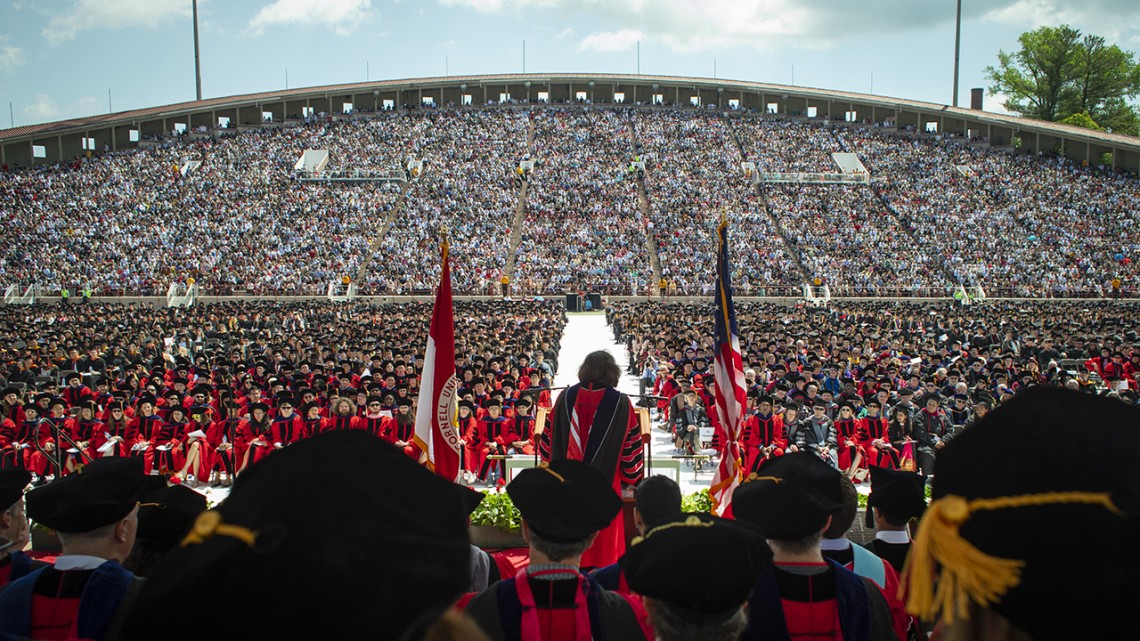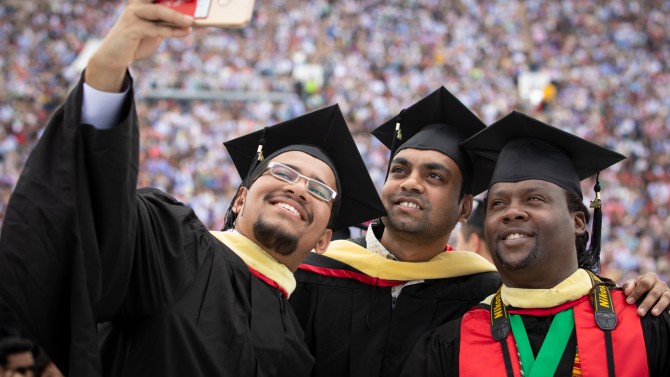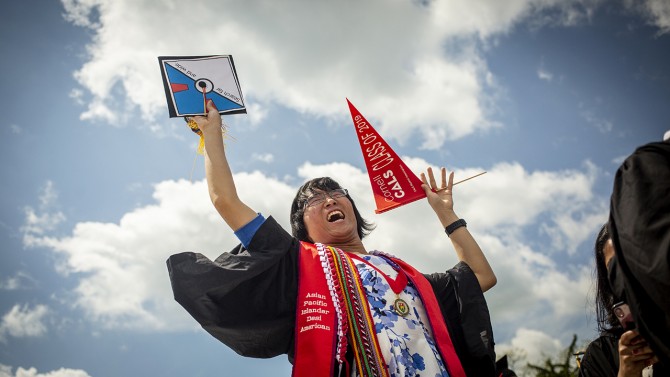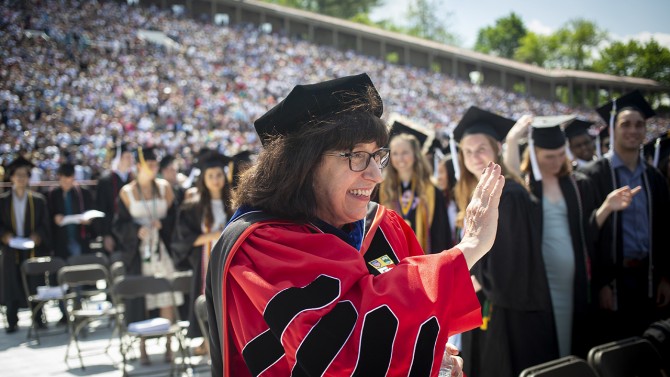
Cornell President Martha E. Pollack delivers her Commencement Address to a full house May 26 at Schoellkopf Field.
Cornell’s radical beginnings still resonate today, Pollack tells Class of 2019
By Joe Wilensky
At Cornell University’s 151st Commencement Ceremony May 26, President Martha E. Pollack stressed that the university’s founding vision of “any person … any study” is not only at the heart of what makes Cornell unique, but also explains broadly why education matters more than ever before.
Pollack welcomed approximately 5,500 graduates and 22,000 family members, faculty, trustees, staff and friends who filled Schoellkopf Field to celebrate the conferring of degrees.
Looking out over the full house, Pollack noted that Cornell’s first Commencement ceremony had been held in 1869, a century and a half ago. That graduation was very different, she said, and the parents of those first graduates had one notable advantage: “It was a lot easier for them to pick their own children out of the graduating class – because there were only eight of them.”
Pollack recalled Cornell’s radical beginnings, rooted in founder Ezra Cornell’s words: “I would found an institution where any person can find instruction in any study.”
“Even today, those words sound incredibly ambitious,” Pollack said. “But back then, they were downright revolutionary: the rallying cry of a university designed to change not just the lives of its students, but the future of our nation.”
That openness was so controversial to some, Pollack said, that it might have actually prompted some students to apply to Cornell simply because their curiosity had been piqued amid the warnings against it.
She described Ezra Cornell’s and first university president Andrew Dickson White’s establishment of Cornell University as created on the premise – still novel at the time – that education was a public good, “not just for the individual student, but for everyone.” By fostering innovation, creativity and a sharing of ideas across society, and not placing boundaries on learning, the new university set out to ultimately build a better world.
Addressing the Class of 2019, Pollack stressed that today, “when the importance of diversity and of interdisciplinarity in education is anything but a radical idea, we might still ask, ‘So, what’s so special about Cornell?’”
To answer, she told the story of the time, just a few weeks after she had been inaugurated as president, when she was invited by Chris Kim, Cornell’s director of orchestras, to narrate an upcoming Cornell Symphony Orchestra performance of Gunther Schuller’s “Journey Into Jazz.”
After noting that her only musical training had been elementary-school violin lessons that her parents had mercifully allowed her to stop taking (“out of kindness to me and the neighbors,” she recalled), Pollack admitted that the idea of narrating a musical performance had been a bit outside her comfort zone.
But, as the university’s new president, she realized she had been spending a lot of her time “encouraging people to try new things, to build out-of-the-box partnerships, to push their own boundaries.” So she embraced the opportunity.
The concert, performed in a jam-packed Bailey Hall, was a tremendous success, “and the student musicians were amazing,” Pollack said. “It will always be one of my warmest memories of my early days at Cornell.”
But more importantly for Pollack, the lesson of the story itself resonated beyond that day’s performance. She said the narrative – about a young boy who wants to learn to play jazz trumpet – carries some deep lessons about the “any person … any study” ethos.
In the story, Pollack recalled, the boy, Eddie, learns to first make music with his trumpet, then with other players and, finally, “with his full self.”
“He had to learn from the oboes, the pianos and the saxophones,” Pollack said. “He had to learn from different orchestras, traditions and styles. He had to learn how to make his music with others before he could make his music his own.
“To me, it’s an amazing metaphor for how all of us learn and explore, and how any of us learn deeply and well,” she said. “Not just from each other, but with each other; through experimentation and innovation; across fields and disciplines; through our differences and our diversity, with everything that makes us who we are.”
Pollack noted that just as the orchestra needed every instrument to create its fullest sound, Cornell needs the diversity of its community, as well as the breadth of its fields of study, to create the fullest environment for learning. This is also why education itself, and universities like Cornell, still matter so much, she said. They give students the ability to master the questions of life, “as Ezra Cornell put it, ‘with success and with honor,’” she said.
She congratulated the graduates, and, in lieu of giving advice, made two requests. The first, which she said drew directly from the previous day’s Senior Convocation address by Bill Nye ’77: “Vote. Make your voice known.”
Her second request was that in the future, when the graduates look back on their time at Cornell, they think not only about the university as they have personally known it, but to meld those memories with those of Cornell’s radical origins, and that of founder Ezra Cornell’s belief that “spreading truth and knowledge, openness and curiosity – through generations of graduates like yourselves – was the greatest good he could possibly do.”
Media Contact
Get Cornell news delivered right to your inbox.
Subscribe







